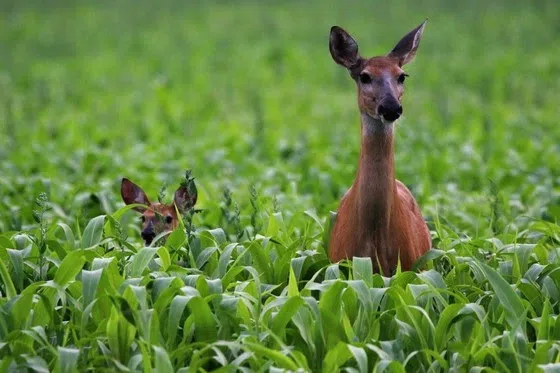CALUMET COUNTY, WI (WTAQ-WLUK) — The countdown is on as hundreds of thousands of hunters are gearing up for Saturday’s Wisconsin gun deer season opener.
But those hunters are also being asked to help fight the spread of a deadly deer condition called chronic wasting disease.
“CWD does remain a significant concern in the state of Wisconsin, as deer are an incredibly valuable resource in our state. The disease was first detected in 2002, and since that time, we have seen an increasing percent of deer infected in some parts of the state,” Jasmine Batten, DNR Wildlife Health Section Supervisor.
Batten says most CWD cases are in southwest Wisconsin, but that is spreading north.
“Last year, we did detect CWD for the first time in wild deer in a number of counties in the state, including Buffalo, Langlade, Waupaca and Winnebago counties,” she said.
CWD is highly contagious, and fatal in animals. It impacts the nervous systems of deer, elk, moose, and caribou. Experts say the disease can linger in soil, or other infected animals, so bans on baiting and feeding deer will follow.
“It is a risk factor for CWD spread, and there are counties in the state where baiting and feeding is prohibited,” said Batten.
That includes Calumet County, where a previous baiting ban expired, then was reinstated just days later.
“Our biologists contacted me and said that now there has been a CWD-positive on a captive herd in Outagamie County. So again, we’re back in the ban,” said Keith Propson, Calumet County Deer Advisory Council Chair.
Propson says deer carcass waste disposal sites are available, and hunters are encouraged to test their harvested deer at places like this self-serve kiosk near High Cliff State Park.
“It can definitely be frustrating for some of the local hunters, by the fact that we haven’t had a positive case here, but I think most hunters are aware of what the potential can be, if it infects deer and the whole herd. And I think most of them are now willing to do whatever it takes to maintain that we’re CWD-clear-and-free, and we don’t have any cases here,” he said.
According to the U.S. Centers for Disease Control and Prevention, there have been no confirmed cases of CWD being transferred to humans. Officials reinforce the message.
“Since the beginning of awareness of Chronic Wasting Disease, and this comes from nationally, the World Health Organization, and others. From a clinical standpoint, it simply is the recommendation is to not eat meat from a known positive animal,” said Jeff Pritzl, DNR State Deer Program Specialist.
Meanwhile testing and tracking continue. Jasmine Batten says while there is no cure for CWD, hunters play a role too by thinning the herd.
“One of the most important things that hunters can do, is keep hunting. Hunters are our number one defense against CWD. And CWD is not a reason for hunters to stop doing what they love to do,” she said.
The nine-day campaign begins on Saturday morning.








